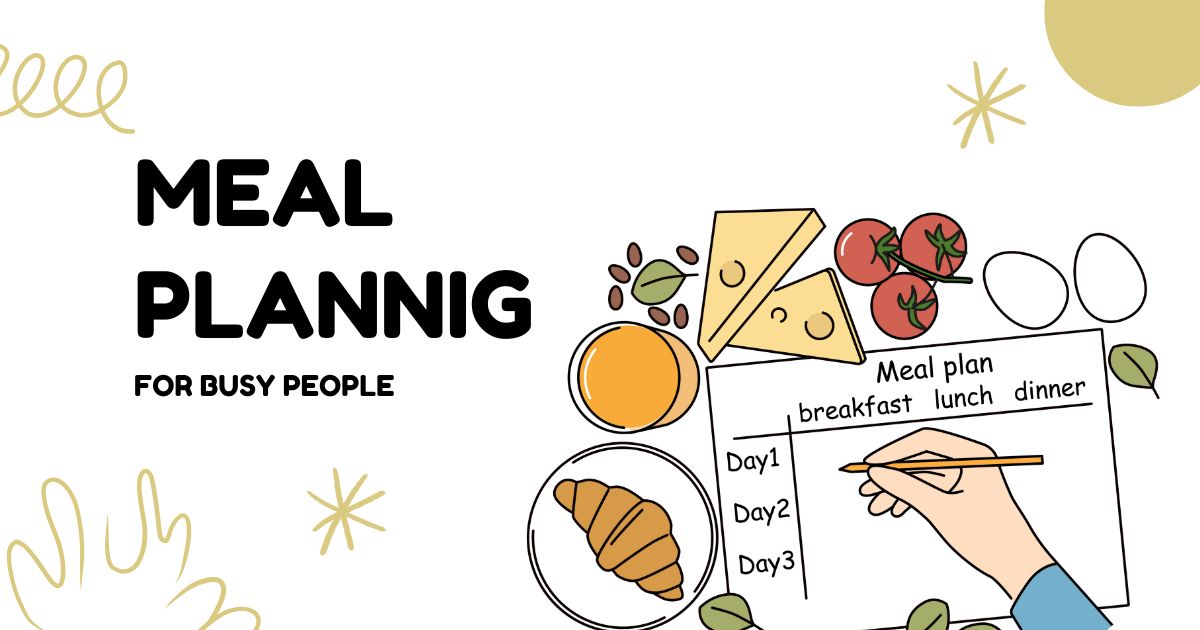In today’s fast-paced world, juggling work, family, and personal responsibilities often leaves little time for preparing nutritious meals. As a result, many people fall into the trap of grabbing fast food or skipping meals altogether. The solution? Meal planning. By taking a few minutes each week to plan ahead, busy people can enjoy healthy, delicious meals without the stress.
This article will guide you through practical meal planning strategies, benefits, and tips to make healthy eating simple, even with the busiest schedule.
Why Meal Planning Matters for Busy People
Meal planning is not just about food—it’s about time, health, and balance. When you plan your meals in advance, you:
-
Save time by avoiding last-minute cooking decisions.
-
Reduce stress by having a clear food schedule.
-
Save money by cutting down on takeout and food waste.
-
Maintain a balanced diet that supports your energy levels and overall health.
For busy individuals, meal planning is the key to making healthy eating sustainable.
The Benefits of Meal Planning
1. Saves Time and Effort
Planning your meals for the week minimizes daily decision-making. A grocery list tailored to your plan ensures one efficient shopping trip instead of multiple last-minute runs.
2. Promotes Healthier Choices
When meals are planned, you’re less likely to grab unhealthy snacks or fast food. Instead, you’ll have balanced, nutrient-rich meals ready to go.
3. Reduces Food Waste
By buying only what you need for your planned meals, you cut down on excess groceries that often spoil.
4. Supports Weight Management
Meal planning helps control portion sizes and keeps you on track with your health or fitness goals.
5. Saves Money
Cooking at home costs far less than eating out. With meal planning, your grocery bill becomes predictable and efficient.
Steps to Create a Simple Meal Plan
Step 1: Assess Your Schedule
Look at your week ahead. Do you have long workdays, family commitments, or travel? Plan simpler meals for busier days and slightly more elaborate ones for free days.
Step 2: Choose Recipes
Pick recipes that are:
-
Quick (under 30 minutes).
-
Balanced (include protein, carbs, and healthy fats).
-
Familiar yet flexible (so you can swap ingredients if needed).
Step 3: Batch Cooking
Prepare ingredients in bulk—like chopping veggies, cooking grains, or grilling chicken—so meals can be assembled quickly.
Step 4: Store Smartly
Use airtight containers, mason jars, or divided meal prep boxes to keep food fresh. Label them by day for easy grab-and-go access.
Step 5: Stick to a Grocery List
Write down all the ingredients you need based on your meal plan. Avoid impulse buys that don’t align with your plan.
Meal Prep Ideas for Busy Lifestyles
Here are some practical and easy meal prep ideas that suit a packed schedule:
-
Breakfast: Overnight oats, smoothie packs, egg muffins, or Greek yogurt with fruits.
-
Lunch: Mason jar salads, quinoa bowls with roasted veggies, or wraps with lean protein.
-
Dinner: One-pan roasted chicken and vegetables, stir-fry with pre-cut veggies, or sheet pan salmon.
-
Snacks: Hummus with carrots, mixed nuts, fruit slices, or homemade energy bites.
Tools to Simplify Meal Planning
Technology can make meal planning even easier. Consider using:
-
Meal planning apps like Mealime, Paprika, or Yummly for recipe suggestions and shopping lists.
-
Smart kitchen tools such as Instant Pots, slow cookers, or air fryers to reduce cooking time.
-
Grocery delivery services for quick and convenient shopping.
Common Mistakes to Avoid
Even with the best intentions, many people make mistakes that derail their meal planning. Avoid these pitfalls:
-
Overcomplicating meals – Stick to simple recipes you actually enjoy.
-
Not prepping in advance – Spend 1–2 hours each weekend on prep.
-
Ignoring snacks – Healthy snacks prevent binge eating later.
-
Failing to stay flexible – Life happens. Always keep a backup meal (like frozen veggies or canned beans).
Sample 5-Day Meal Plan for Busy People
Here’s a quick sample plan to inspire you:
1st Day
-
Breakfast: Overnight oats with berries
-
Lunch: Quinoa salad with chickpeas and veggies
-
Dinner: Grilled chicken with sweet potato and broccoli
-
Snack: Apple slices with peanut butter
2nd Day
-
Breakfast: Greek yogurt with granola
-
Lunch: Turkey and avocado wrap
-
Dinner: Stir-fried tofu with rice and veggies
-
Snack: Mixed nuts
-
Breakfast: Smoothie (spinach, banana, protein powder)
-
Lunch: Mason jar salad with tuna
-
Dinner: One-pan salmon with roasted asparagus
-
Snack: Hummus with carrot sticks
4th Day
-
Breakfast: Scrambled eggs with spinach
-
Lunch: Brown rice with grilled chicken
-
Dinner: Lentil soup with whole-grain bread
-
Snack: Energy bites
5th Day
-
Breakfast: Chia pudding with almond milk
-
Lunch: Leftover lentil soup
-
Dinner: Shrimp stir-fry with noodles
-
Snack: Popcorn
Balancing Flexibility with Structure
The best meal plan is one that fits your lifestyle, not complicates it. Be consistent but flexible—if you miss a planned meal, swap it with another or use leftovers creatively. The key is to build a system that works long term.
Conclusion
Meal planning is not about being perfect—it’s about being prepared. For busy people, it eliminates stress, saves time, and makes healthy eating realistic. With a little organization and the right tools, you can enjoy delicious, balanced meals all week long without sacrificing your busy schedule.
Also Read : Natural Remedies vs. Modern Medicine – When to Choose What
FAQs
Q1: How long does meal planning take each week?
Usually 30–60 minutes for planning and 1–2 hours for meal prep.
Q2: Can I meal plan if I don’t like cooking?
Yes! Focus on simple recipes, no-cook meals, or batch-prepped items. You can also use slow cookers or Instant Pots.
Q3: Is meal planning expensive?
No, in fact, it saves money by reducing takeout and food waste.
Q4: How long do prepped meals stay fresh?
Most meals last 3–4 days in the fridge. For longer storage, freeze portions.
Q5: Can meal planning help with weight loss?
Absolutely. It helps control portions, ensures balanced nutrition, and prevents unhealthy snacking.



